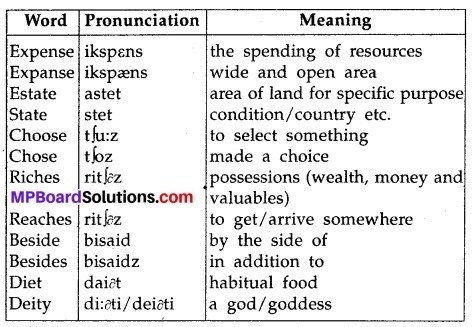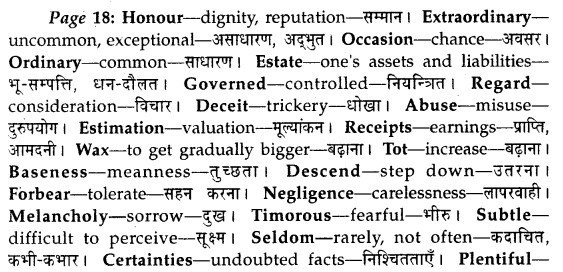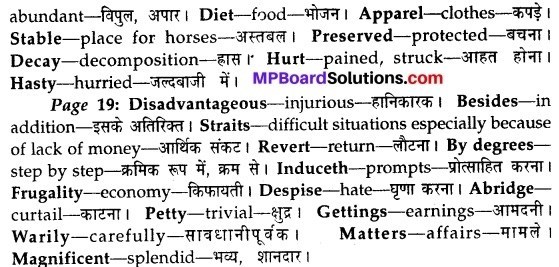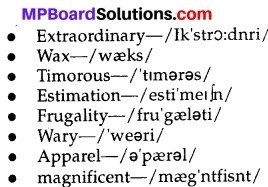Are you seeking for the Madhya Pradesh Board Solutions 10th English Chapter 3 Of Expense Questions and Answers PDF? If yes, then read this entire page. Here, we are giving a direct link to download MP Board Class 10th English Solutions Questions and Answers PDF which contains the chapter wise questions, solutions, and grammar topics. You can also get the shortcuts to solve the grammar related questions on this page.
MP Board Class 10th English The Rainbow Solutions Chapter 3 Of Expense (Francis Bacon)
For the sake of students we have gathered the complete 10th English Chapter 3 Of Expense Questions and Answers can provided in pdf Pattern. Refer the chapter wise MP Board Class 10th English Solutions Questions and Answers Topics and start the preparation. You can estimate the importance of each chapter, find important English grammar concepts which are having more weightage. Concentrate on the important grammar topics from Madhya Pradesh Board Solutions for 10th English Chapter 3 Of Expense Questions and Answers PDF, prepare well for the exam.
Of Expense Textbook Exercises
Of Expense Vocabulary
I. Find single words in the lesson which have roughly the meanings given below:
Mp Board Class 10 English Chapter 3 Question 1.
wonderfully fine
Answer:
magnificent
Of Expense Summary In Hindi MP Board Question 2.
to fall to a lower or worse state
Answer:
decay
Class 10 English Chapter 3 Mp Board Question 3.
the quality of being dishonest
Answer:
baseness
Class 10 English Chapter 3 Of Expense MP Board Question 4.
the great respect and admiration which people have for a person, country etc. often publically expressed
Answer:
estimation
Mp Board Class 10th English Chapter 3 Question 5.
the money used or needed for a purpose
Answer:
gettings
II. Use the following words in your own sentences.
hardly, scarcely, barely
Answer:
Hardly—We had hardly begun our walk, when it began to rain. Scarcely—There were scarcely fifty students present in the class. Barely-I barely had time to catch the train.
III. Say the following words and notice the difference in their pronunciation and meaning.
expense – expanse
estate – state
choose – chose
riches – reaches
beside – besides
diet – deity
Answer:

Comprehension
A. Answer the following questions in about 25 words.
Mp Board Class 10 English Workbook Solutions Chapter 3 Question 1.
How should prudent spending of riches be done?
Answer:
Riches are meant to be spent wisely. They are not meant to be wasted. They should be spent for honour and good actions. They should be spent keeping in view the worth of the occasion. Such spendings are known as prudent spendings.
Chapter 3 English Class 10 Mp Board Question 2.
What are the two motives for the sacrifice of all other possessions?
Answer:
Every man has a number of possessions. They include his estate, his regular income and his casual gettings. Honour and good actions are the two motives for the sacrifice of all other possessions.
Of Expense Questions And Answers MP Board Question 3.
What is Bacon’s advice on extraordinary expenses?
Answer:
In the essay ‘Of Expense’, Francis Bacon gives us an advice. He says that we should limit our extraordinary expenses, keeping in view the worth of the occasion. This means, the people should be discreet in spending money.
Of Expense Summary In English MP Board Question 4.
What are Bacon’s views on servants and employees?
Answer:
Bacon holds adverse views on servants and employees. He says that servants and employees are tricksters. They might deceive you if they spend your money on your behalf. They may also exploit you by keeping some money with them.
10th Class English Chapter 3 Question Answer MP Board Question 5.
Why should one keep one’s expenses within the limits of one’s income?
Answer:
Some people are quite spendthrift. They spend lavishly. They don’t keep their expenses within the limits of their income. They become the object of decay, sooner or later. Hence one should keep one’s expenses within the limits of one’s income.
Question 6.
What will be the fate of a man who is plentiful in expenses of all kinds?
Answer:
Some people do not realise the importance of economy. They do not believe in the habit of saving. They are plentiful in incurring expenses of all kinds. As a result they spend whatever they earn. Thus their fockets are emptied continuously and they fall into the grip of decay.
Question 7.
Where does one tend to be plentiful in expense?
Answer:
One tends to be plentiful in matters of diet and in the hall. These are important matters. Besides he should be saving in costumes, in stable and the like. Otherwise the economic balance will be disturbed.
Question 8.
Why is hasty selling disadvantageous?
Answer:
Sometimes a man wants to dispose of his estate. He should be very careful in it. If we make undue haste in selling our estate, we would be duped by the middleman. It would pinch us lifelong because haste makes waste.
B. Answer the following questions in about 50 words.
Question 1.
Sum up the salutary rules for expenditure suggested by Bacon in the lesson.
Answer:
Bacon has suggested the following salutary rules for expenditure in the lesson ‘Of Expense’. Bacon instructs his readers to be discreet in spending money. According to him, one should spend only a fixed portion of his income. The servants and employees should not be relied on. People should keep a proper balance between their gettings and spendings. They should never be wasteful in their expenditure. They should always be thoughtful in spending. It would save them from many dangers.
Question 2.
What does Bacon want to convey, when he says “To turn all to certainties’?
Answer:
Bacon is in favour of turning all to certainties. He instructs his readers to curtail their ordinary expenses. An individual must not spend more than half of his earnings. He should keep the balance between his earnings and expenditure. He should not depend on his servants and employees because they would bring only sorrow and uncertainty. He should be aware of the fact that his indiscreet spending would definitely bring pain in his life.
Question 3.
Distinguish between ordinary and extraordinary expenses in the light of the views expressed by Bacon. (M.P. Board 2016)
Answer:
Francis Bacon refers to two types of expenses. He terms them as ordinary and extraordinary expenses. Ordinary expenses are normal, usual and unavoidable routine expenses. They can be calculated in advance. Expenses on food, milk, fees for the children and payment of bills are necessary expenses. Extraordinary expenses are those expenses which are casual. They cannot be foreseen. The expenses on medicine, entertainment of guests, purchase of fashion items etc. come under this category.
Question 4.
How should riches be spent and husbanded to the best advantage? Support your answer with textual references.
Answer:
Riches are meant to be spent and not to be wasted. We should not depend on servants, employees or others in managing our financial matters. The wearer alone knows where the shoe pinches. Nobody else will feel pain while wasting your money. A prudent person always saves half of his earnings to avoid himself from sorrow. Riches should be spent keeping in view one’s own estate. There should be a healthy balance between the ordinary and the extraordinary expenses. The financial matters should be in one’s own hands.
Question 5.
How far are the views of Bacon relevant to the present time?
Answer:
Bacon was of the view that his readers should be discreet in spending money. We should spend only a fixed portion of our income and save the rest for the rainy day. We should personally look after our financial matters. His views are partially relevant to the present time. The way of life has totally changed now. Ladies and children have an upper hand in spending the money. The salaried people with a fixed singie income live from hand to month. Therefore, the question of saving money is a silly thought in the present scenario. Still we should save some amount to avoid future uncertainties.
Grammar
Study the following sentences.
1. Extraordinary expenses must be limited by the worth of the occasion.
2. Ordinary expense ought to be limited by a man’s estate.
3. Bills may be less than’ the estimation abroad.
4. But wounds cannot be cured without searching.
5. In clearing of a man’s estate, he may as well hurt himself in being too sudden, as in letting it run on too long.
The underlined verbs are Modals Auxiliaries. They are also called defective verbs because they cannot be used in all tenses and moods.
Study the chart carefully
| 1 | 2 |
| Primary Auxiliaries | Modal Auxiliaries |
| be: am, is, are, was, were do, does, did, have, has, had | can, could, may, might, shall, should, will, would, must (am to, is to, are to, have to etc.) ought to, used to, need, dare. |
List out Primary and Modal Auxiliary separately from the text ‘Of Expense’
Answer:
| Primary Auxiliaries | Modal Auxiliaries |
| are, be, is, has, have | must (be, may be), ought to, may, will, shall, cannot, need, can, will, may |
Speaking Skill
Deliver the following dialogues between two friends in the market in a proper manner:
Mrs. Ansari—Mrs. Gupta looks very busy nowadays.
Mrs. Sharma—Does she? Formerly she used to return home early in the evening from the office.
Mrs. Ansari—Yes, but now she has taken up a new project. Mrs. Sharm. This is indeed a good news. She is definitely doing a good job.
Mrs. Ansari—Now she is going to buy a car very shortly and is also planning to have a flat in a posh colony.
Answer:
Mrs. Ansari told Mrs. Sharma that Mrs. Gupta looked very busy these days.
Mrs. Sharma felt surprised and asked Mrs. Ansari if she (Mrs. Gupta) actually did (look very busy these days). She added that formerly Mrs. Gupta used to return home early in the evening from the office. .
Mrs. Ansari replied in the affirmative but intervened saying that she had taken a new project. Mrs. Sharma called that a good news. She (Mrs. Sharma) added that she (Mrs. Gupta) was definitely doing a good job.
Mrs. Ansari endorsed Mrs. Sharma’s words. She appreciated that she (Mrs. Gupta) was going to buy a car very shortly and was also planning to have a flat in a posh colony.
Now converse in pairs what you would do to make a progress. These hints will help you.
- Then your activity intelligently
- work hard and manage your time
- choose a field of your choice
- invest in shares
Hardik—I have become a property agent.
Shivam—Do you have previous experience in this line?
Hardik—Yes, I have been working with a property dealer for the last five years.
Shivam—What are the basic requirements of this task?
Hardik—Hard work and time management.
Shivam—Which area have you chosen?
Hardik—I have chosen the area around Bhopal. I have arranged the initial money.
Shivam—May God grant you progress in your ambition!
Writing Skill
Question 1.
Write a short note on ‘proper money management’. (50 words)
Answer:
Money is not meant to be wasted. It is rather to be spent usefully and meaningfully. Every penny has its own value. It should be spent judiciously. Assess the utility of the item you undertake to purchase. Money should be spent open heartedly on necessities. It should be spent half heartedly on comforts. The purchase of luxuries should be neglected. Spend on the maintenance of assets. Spend on the health and education. Spend the least on fashion items. Eat well and clothe yourself well. Money should add to your joy and curtail your sorrow.
Question 2.
Your friend Rajesh residing at 21/4 Adhartal, Jabalpur, is very extravagant. Write a letter suggesting him how extravagance is to be minimized. (150 ivords)
Ans.
V.&.P. O. Sadhrana
A 3/12, Shivaji Enclave
To
21/4 Adhartal, Jabalpur,
17th July, 20xx
Dear Rajesh.
I have come to know that you are very extravagant. You buy unnecessary items and pile them up in your room. They consume most of your earnings. Moreover, they get outdated quite soon and are disposed off at dire cheap rates.
I advise you to think twice about the utility of the items before purchasing them. Consider its price and durability. See that the item you have purchased is needed badly in your house. It should not be a source of dispute or unpleasantness in your family. These considerations will minimize your extravagance. Hope, you will act upon my advice. With love.
Yours,
Subhash Vasistha
Think It Over
Question 1.
If you think you are being trapped into a pit, stop digging it. Think how far it is applicable to our financial behaviour. Elaborate.
Answer:
We should be very prudent in our financial behaviour! We are living in kalyug. Every relation has gone to the dogs. The people do not hesitate to cheat you by sweet but tricky words. There are dupes who would ask you to dig a pit and then bury you into it. In other words, they would urge you to spend your savings in some so-called fruitful business and rob you on the pretext of providing you with a chance to earn more. If at any stage, you smell their mischief, you should wind up your dealings with them, and stop digging the pit if you think you are being trapped into it.
Question 2.
Bacon says that one should make a good choice of servants and change them as often as conditions permit. Think why he wants us to change them and write your opinion.
Answer:
Bacon was called by Pope as the wisest of mankind. He has guided us to manage our financial matters ourselves. He calls servants double-edged swords. They rob their masters with both hands. They save money while making purchases. They also make silly purchases of unwanted items. On staying together for years the servants of a house/locality form a clique. They cause all types of harm to their masters and their families. They cause murders, robberies and kidnappings. Therefore, one should make a good, choice of servants and change them as often as conditions permit lest it should be too late.
Things To Do
One should buy more assets and less liabilities. Assets bring profits whereas liabilities cause expenses. As a student, classify the following things according to your needs. house, car, fixed deposit, land, education, motorcycle Add some more assets and liabilities to the list.
Answer:

Of Expense Additional Important Questions
A.Read the passage and answer questions that follow:
1. Besides, he that clears at once will replace; for finding himself out of straits, he will revert to his customs; but he that cleareth by degrees induceth a habit of frugality, and gaineth as well upon his mind as upon his estate. Certainly, who hath a state to repair, may not despise small things; and commonly it is less dishonourable to abridge petty charges, than to stop to petty gettings. A man ought warily to begin charges which once begun will continue: but in matters that return not he may be more magnificent. (Page 19)
Questions:
(a) The above passage is taken from:
(i) The Happy Prince
(ii) Of Expense
(iii) The Bet
(iv) Refund
(b) Find a word from the above passage that is similar in meaning to ‘tradition’.
(c) Find a word from the above passage that is opposite in meaning to ‘dull’.
(d) Why will the person return to his customs?
Answers:
(a) (ii) Of Expense
(b) custom
(c) magnificent
(d) He will return to his customs because he will find himself out of straits.
I. Match the following:
1. Riches are for – (a) expenses of all kinds
2. Spending is for – (b) without searching
3. Wounds cannot be cured – (c) timorous and less subtle
4. New servants are more – (d) spending
5. Don’t be plentiful in – (e) honour and good actions
Answer:
1. (d), 2. (e), 3. (b), 4. (c), 5. (a).
II. Pick up the correct choice:
(i) (a) Extraordinary expense must be limited by the (worth/necessity) of the occasion.
(b) Ordinary expense ought to be limited by a man’s (state/estate).
(c) Bills may be less than the (estimate/estimation) abroad.
(id) If he is(wasteful/plentiful) in diet, he must be saving in apparel.
Answer:
(a) worth
(b) estate
(c) estimation
(d) plentiful.
(ii) (a) Man’s ordinary expenses (ought/ought to) be but to the half of his receipts.
(b) Wounds cannot be cured without (search/ searching)
(c)If he be painful in the hall to be saving in the (stable, cowshed)
(d) (Hasty/Hurried) selling is commonly as disadvantageous as interest.
Answer:
(a) ought to
(b) searching
(c) stable
(d) Hasty.
III. Write ‘True’ or ‘False’.
1. ’Of Expense 1 is a guide to show us how we should manage our financial matters.
2. Alexander Pope called Francis Bacon the ’luckiest of mankind’.
3. Ordinary expenses must not be subject to deceit and abuse of servants.
4. The employees should be changed often.
5. He that cleareth by degrees induceth a habit of frugality.
Answer:
1. True, 2. False, 3. True, 4. True, 5. True.
IV. Fill in the following blanks:
1. Certainly who hath …………. may not despise small things.
2. Riches are for ……….. and spending for honour and good actions
3. It is no ………….. for the greatest to descend and look into their own estate.
4. New servants are more ………….. and less subtle.
5. He that is ……….. in expenses of all kinds will hardly be preserved from decay.
Answer:
- a state to repair
- spending
- baseness
- timorous
- plentiful.
B. Short Answer Type Questions (In about 25 words)
Question 1.
Give a brief life-sketch of Francis Bacon.
Answer:
Francis Bacon was born in 1561 at York House in London. He sought his education at Trinity College, Cambridge. He became a member of Parliament in 1584. He wrote several papers on public affairs. His essays are full of worldly wisdom. Alexander Pope has rightly said that he was ‘the wisest of mankind’.
Question 2.
What is Bacon’s opinion about old and new servants?
Answer:
A prudent person should manage his financial affairs himself. If he has no time to do so, he should choose well those whom he employs. The present-day servants are a nuisance. Most of them are criminals or run away from law. The rule ‘Old is gold/ does not hold good in their case. The new servants prove more timorous and less subtle.
Question 3.
What is the basic need of the present man?
Answer:
The basic need of the present man is to be frugal. If he happens to be plentiful in some kind of expense, then he should be economical in some other expense. If he is plentiful in matters of diet, he should be saving in clothes. If he spends more on watching films, he should save in some other items.
Question 4.
What happens to a person who is plentiful in expenses of all kinds?
Answer:
Every man gets a fixed income. One can hardly make both the ends. If we fail to spend the hard-earned money economically it would be spent in total. Then what will happen during rainy days? The person concerned will fall in the grip of decay and will become a borrower. Hence, it is wise to be wise in spending money.
C. Long Answer Type Questions (In about 50 words)
Question 1.
What are the modes of expenditure of the present day city-dwellers?
Answer:
The city-dwellers are the most extravagant fellows in the present day world. They hold nuclear families which have no place for the aged persons. They spend their monthly income in advance. They pay the heavy bills of the items purchased on installments. They spend less on food items and more on clothes and items of decoration. Medicines, and education of children and transportation consume the better part of their incomes. They spend unduly on celebrations.
Of Expense Introduction
This essay teaches us how we should manage our financial matters. The author instructs his readers to be discreet in spending money. He wants them to spend only a fixed portion of their income to avoid future uncertainties.
Of Expense Summary in English
Riches are for spending honourably and in noble actions. Extraordinary expenses must be limited by the worth of the occasion and by a man’s estate. We should spend the money thoughtfully so that the servants might not deceive us or abuse our money. A wise man’s expenses never exceed half of his irıcome. There is no harm for a great man to look into his own estate to avoid sorrow.
If we are plentiful in some kind of expense, we must be frugal in certain other kinds. He who is plentiful in expenses of all kinds will meet decay. Hasteful clearing of one’s estates hurts one a great deal. It proves disadvantageous. Clearing the estates by degrees induces a habit of frugality. It proves advantageous both financially and mentally. A man ought to begin charges carefully. It is not silly to curtail petty charges in comparison with stopping to petty earnings.
Of Expense Summary in Hindi
धनराशि, सम्मानपूर्वक ढंग से और नेक कामों में खर्च करने के लिए है। समय को तथा मनुष्य की हैसियत को देखकर असाधारण खर्चों को सीमित करना चाहिए। हमें धनराशि को सोच-समझकर खर्च करना चाहिए ताकि नौकर हमें धोखा नहीं दे सकें और हमारी धनराशि का दुरुपयोग नहीं कर सकें। किसी बुद्धिमान व्यक्ति का खर्च उसकी आधी आमदनी से अधिक नहीं बढ़ता है। दुख से बचने के लिए अपनी हैसियत (सम्पत्ति) को ध्यान में रखने में किसी महान् पुरुष को कोई हानि नहीं है।
यदि हम किसी खर्च में मुक्तहस्त हो जाते हैं तो हमें किन्हीं दूसरे खर्चों में किफायती (कृपण) होना चाहिए। जो सभी खर्चों में मुक्तहस्त होता है वह बर्बाद हो जाता है। यदि अपनी भूसम्पत्ति का जल्दबाजी में सौदा किया जाएगा तो वह काफी दुख का कारण बन जाएगा । वह हानिकारक सिद्ध होता है, क्रमिक रूप से भूसम्पत्ति का निपटारा करना किफायतसारी (कृपणता) की प्रवृति को प्रोत्साहित करता है। यह आर्थिक तथा मानसिक दोनों रूपों में लाभप्रद सिद्ध होता है। मनुष्यों को सावधानीपूर्वक आदेय प्रारम्भ करने चाहिएं। हलकी-फुलकी आमदनी को समाप्त करने की तुलना में छोटे आदेयों को घटाना मूर्खता नहीं है।
Of Expense Word-Meanings


Of Expense Some Important Pronunciations

Hope that the above shaped information regarding the Madhya Pradesh Board Solutions for 10th English Chapter 3 Of Expense Questions and Answers is useful for making your preparation effective. View our website regularly to get other subjects solutions.